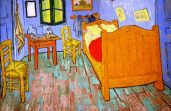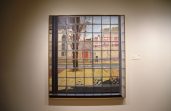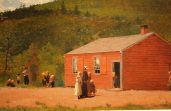September 2007
Nine-Eleven
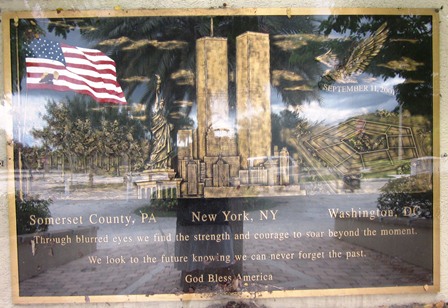
“Now, we have inscribed a new memory alongside those others. It’s a memory of tragedy and shock, of loss and mourning. But not only of loss and mourning. It’s also a memory of bravery and self-sacrifice, and the love that lays down its life for a friend–even a friend whose name it never knew. Time is passing. Yet, for the United States of America, there will be no forgetting September the 11th. We will remember every rescuer who died in honor. We will remember every family that lives in grief. We will remember the fire and ash, the last phone calls, the funerals of the children.” ~ President George W. Bush ~ December 11, 2001 and November 11, 2001
In the old days, before cell phones, the Internet, laptops, and text messages, travel allowed you to leave your known world behind, when you ventured into new lands, be they foreign or domestic. You would send post cards home, which often arrived after you returned, and might periodically check in with an American Express office, for a piece of mail, from a concerned parent. If there was an emergency, you could make a phone call or even look to receive a cable with a little extra cash; but otherwise you were able to travel completely oblivious, of your life, at home.
In February of 1981, I was returning home, to Los Angeles, from my first trip to Europe. I was flying on Trans World Airlines, on a very long and relatively empty flight. After dinner, I had walked to the rear of the plane, where I planned to stretch out, and rest for awhile. The plane was all but dark, as most passengers had also decided to sleep the miles away. I easily found three seats together, and claimed them for myself. Sitting, on one of the chairs, was a copy of a news magazine, with a picture of an airplane, its front door open to mobile stairs, and people gathered, on the tarmac, to meet the descending passengers. The caption stated that after 444 days in captivity, our hostages had finally been released!
After absorbing the headline, I looked around for someone with whom I could share my news; but everyone was sleeping. The magazine was weeks old, but I nonetheless read it from cover to cover, for me, as I sat alone, in the back of the plane, crying, the hostages were finally free. I had watched this crisis for almost a year, as Ted Koppel daily counted down the days that Americans were held hostage, in Iran. Yet, after a few months, out of the country, I had completely forgotten the hostages and the presidential inaugural.
Somewhere along my journey, I could have picked up a newspaper or turned into an evening news program, but I was busy having an adventure and with no personal electronics, to force me to be connected, it was easy to let go. This was a moment, the release of our hostages, which we had been waiting for, as a nation, but I was not a part of that experience. I had learned twentieth century news, in nineteenth century fashion which made it personal, but not collective.
Technology has created a collective memory. For Americans, I think our first collective memory is December 7, 1941, the day Pearl Harbor was bombed, and we entered World War II. It was the day that would live in infamy and the day when everyone who was alive and cognizant would be able to recall where they were and what they were doing, when they heard the news. It was also the beginning of a time line based on moments. Americans, scattered over various time zones, had tuned into their radios, to hear the news together, creating a collective memory.
On September 11, 2001, America’s first collective memory, of the twenty-first century, was permanently etched into our minds, with images of airplanes, burning buildings and rescue workers.
I remember having tea, at my desk. I remember that I was wearing a white, cotton, embroidered gown, which I no longer have. I remember that I was sitting at my computer, with National Public Radio, playing in the background. I remember that Kate was working in Miami, on the Texaco account, before it had become Chevron-Texaco. I remember that it was a bright, sunny day and the green parrots had come to feed early, and I could still see them in the yard. I remember that the day was entirely ordinary.
I was working in a word program, off line, in the days before DSL. The radio announcer said that a plane had flown into the World Trade Center, North Tower, in New York City. I barely stopped to listen. I wondered what kind of weather they were having in New York. The announcer quickly told me it was a clear day. I remember looking at the time, on the computer screen, it was a little before nine o’clock, in the morning. I kept working, imagining it to be a small private plane that had somehow become lost or disorientated. The Twin Towers were big buildings, how could the pilot not see them? A few minutes later, in amazement, the radio announcer said that a second plane had crashed into the World Trade Center. What? Had I heard correctly?
I did not immediately think that we were under attack. I have spoken to many people, about that day, and most tell me that when the second plane hit they knew this was not an accident. At 9:02, in the morning, on September 11, 2001, when United Air Lines, Flight 175, crashed into the South Tower, I still did not understand what had happened.
I sat at my desk, with the radio on, listening in disbelief. How in the world could two planes crash into the same building? I decided to get on line, which took several minutes. I then went to abcnews.com, which I could not access. Oddly, I remember being distressed that I could not get to ABC News, which in those days was my preferred source of news. I tried CNN, which whose circuits also seemed to be overloaded, and then went back to ABC News, which I was finally able to read. I turned on the television and grabbed the phone – a land line, also in the days before I had a cell phone. I was alone in my house, but I wanted and needed to be connected to the rest of the world.
I spoke with Kate – I do not remember who called whom, only that we were both suddenly upset. I spoke with my mother and my younger sister, Caroline; watched television, surfed news websites, and left the radio on, just in case.
The Pentagon was attacked thirty minutes later, and suddenly everything had changed. American Airlines Flight 77, hit the Pentagon at 9:37, in the morning. The Pentagon was on fire. Washington D.C. had been attacked. At 9:59, I watched in shock as the South Tower collapsed. A few minutes later, at 10:03, United Airlines, Flight 93, crashed in Pennsylvania. At 10:28 the North Tower collapsed and at 5:20, that afternoon, 7 World Trade Center collapsed.
I do not remember the rest of the day, which is not a part of our collective memory. I do not know what time Kate came home. I do not know what we ate for dinner. I do not know if we walked the dogs. I do not remember going to bed. In my journal, I jotted down only a few lines that began with the words: The world stopped today. Of course, I was wrong. The world had not stopped, but we had – at least for a moment.
Before the day had passed into history, the comparisons between December 7, 1941 and Nine-Eleven, as we have come to call this day, had already started. My Mother lived through both days. On December 7, 1941, she was only ten years old, living in Southern Ohio, with her family. She well remembers the day, and the realization that we were at war. On September 11, 2001, my Mother, was in California, visiting friends. It was early in the morning there, when Ronald, our friend, called her in to see the news. I asked her if she had thought the first crash an accident, and she said no, that she knew it was an act of terrorism. I wondered if she thought of the two attacks as similar, and again she said no. On December 7, the Navy had been attacked – one was a military target, the other civilian, and thus the difference between war and terrorism. It was an interesting reasoning process.
After the attack, the President urged us to resume our lives. We were supposed to not let them win, by continuing to go to the movies and out to dinner. I was turning forty that month, and was celebrating with a traditional Cuban party, featuring a spit roasted pig. I was also having surgery, after the birthday party, and my Mother planned to be there for both events. After three days of grounded flights, Americans also got back on planes. My seventy year old Mother, was one of the first, as she flew from California to Florida on September 15 – arriving safe and sound, thank God, I noted in my journal. A few days later, Ronald too flew in for the party, which went on as scheduled, in accordance with the Presidents pleas; but life had changed.
We now had a new collective memory which would stir us to ask each other where we were and what we were doing on Nine-Eleven. Today, we will mark the sixth anniversary of the attacks. For those of us who did not lose a loved one, in the attack, we will collectively remember the day and the astonishing events that unfolded on a Tuesday morning, when it was impossible to turn off the television, which connected to each other and the tragedy which became Nine-Eleven – that is all for now.
~ M ~
September 2007
Ode to the Unknown Dorothy
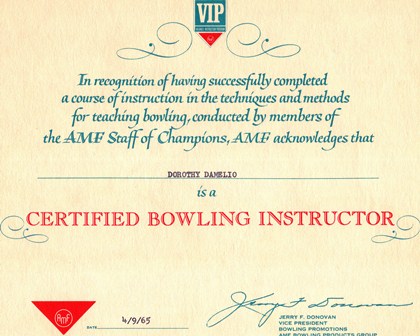
Dorothy passed away sometime last year. I only know that because her shoes and clothes ended up on the curb. At first, I thought it was her husband, who had died. He had Alzheimer’s and would occasionally run away from home; the police would knock on our door to see if we had seen him slip away. Dorothy had few visitors, usually the same cars. She would go out from time to time, coming home with grocery bags, and the like, and we would wave, or tip our heads in acknowledgement of our mutual existence.
Born in Massachusetts, Dorothy married twice, gave birth several times and became a grandmother. She was a certified bowling instructor, who smoked enough that her clothes absorbed the aroma; and she wore colorful costume jewelry, mostly from Avon. Dorothy played cards and made handy crafts. A devout Catholic, she enjoyed reading inspirational books, and like most of us, her taste was a bit tacky when it came to Christmas. In her younger days, she enjoyed traveling and entertaining. Until, the very end, her husband liked surprising her with pictures he painted, and little boxes which read “Happy Thursday” – I think they contained jewelry from Avon.
Like so many of her generation, born in 1922, she had survived the depression, though not unscathed. Dorothy bought in balk, and found it hard to throw anything away – she even saved little pieces of broken costume jewelry and beads which had once belonged to rosaries. She was also quite sentimental, saving every card and letter she had received for years – her children put them all in the trash.
When you are in your twenties and you find Irish linen, still boxed and labeled, at a second hand store, in Albuquerque, you only feel lucky, especially if it carries a twenty-five cent price tag. You do not think about the fact that somebody, with incredibly fine taste, once went to Ireland, and brought back lovely tea towels and napkins, as a souvenir from their trip or that perhaps they were a wedding gift, too precious to be used. Nor do you wonder too much why it is that you have found an English coffee set for only three dollars, wine goblets for a dollar a piece, or a sixty-five cent, first edition of a Hemingway novel– you are just happy to have found your treasure.
In your thirties, when you are rummaging through used books, you stop to read the notes, written in the margins, or the receipts that once served as a book mark. You look at the names, in the front of the books, and you think about how far the book has traveled, to reach your hands, but you are still happy to only have to pay a dollar, to bring home a second edition of a Hemingway novel.
But in your forties, you realize that your treasures not only had another life before they came to rest on your bookshelf or in your china cabinet, but that another person actually once valued your treasure. You begin to wonder how the treasure became trash; and what will become of your own mementos and souvenirs of the life you have led?
Mel sold us our house, across from Dorothy. He and his wife were collectors of many things, including mementous and souvenirs. Mel went from his home to assisted living, and the contents of his house were left for us to address. It is a strange thing to walk into a house and suddenly realize that you are the new owner of someone else’s memories. It is up to you to figure out what to do with their books and linens, as well as the family photographs and collection of miniature cups and saucer.
I remember the night we moved in, our friends who were helping us, wanted to simply through everything out to the curb. As I walked through the house, taking inventory of all that I saw, I felt overwhelmed. The trash bags which Ibis and Bernie kept handing me made sense – bulk pick-up was the next day. But I could not simply bring myself to throw away someone else’s life. Instead, we moved Mel into the garage and Florida room, and we took over the living room. I needed time to deal with him and his life, even if no one else seemed to understand.
Over the months that followed, I grew to know Mel and his wife, who had already passed away. Mel eventually shared Thanksgiving with us, and marveled at the changes we had made in his house, which was now our home. I came to know that Estelle was his second wife, and maybe it was the stepchildren who had disregarded those family portraits that I had to handle.
Since moving into this neighborhood, that was once a haven for retired New Yorkers, I have come across many discarded lives, left on the curb, for bulk pick-up. I am both nosey and I guess cheap – I do like free stuff. I prefer a piece of someone else’s geranium to a new plant from Home Depot, I like the idea of everything having a history; and I hate the idea of things which are perfectly good, ending up as land fill. The down side of this hobby is that time and again, Kate ends up hauling bags of trash home for me, and then on to Goodwill or Faith Farm. I think they actually recognize me at the Lion’s Club drop off site, as I have donated so many discarded glasses.
I have an entire plastic bin, filled with other people’s photographs and slides – people I have never met. I could not bear the thought of them simply being discarded. I always wonder why it is that the families, of our former neighbors, do not want those pictures that documented their mother or father, or uncle or aunt, or grandparent’s life. I mentally catalogue them, as craft material, that I will someday use in some kind of art project – thus justify hanging on to vacation slides of total strangers. I will say, for better or worse, that included in the bin, are the slides that my own father shot and collected from our family travels. I wonder what will become of those slides, as well.
Dorothy and I never met, in person. Going through her discarded life, most of which eventually ended up at the Goodwill, left me thinking a lot about who would end up going through my life. Would someone else understand the value that I had once placed on my things; and would it matter? When we are very young, we learn to become attached to our things, and are forcefully taught to share, which we so often resent. As we begin to mature, and build our lives, we spend a great deal of time and energy working to collect and maintain our material possessions; until we awake one day and find that we are in need of nothing else. It is then when reflection begins.
We start remembering the first milk bottle, that the English maid told us we could take home, as it was so different from anything we had previously seen; and we remember lugging that bottle all through Europe and then on to Israel, and back to Europe, before heading home. Perhaps we now only treasure the bottle because we managed to keep it from breaking, for so many years? Does that really mean it should become a family heirloom?
I hated that Dorothy’s life was so callously thrown away; but maybe for her family, it was just a milk bottle. I know that she was loved by her children, and grandchildren, for I read the letters and cards. I should not be disturbed that they were discarded, but I could not let them go into the trash, so they will go into the bin, for some future art project.
I did keep a blanket, which I think was her husbands. Initially, I separated the wool blanket intending, for it to go to a homeless shelter; but as I was packing up the bag of blankets, I happened to notice the Pendleton Wool tag, and decided to take another look, at the blanket. As I opened the blanket, I noticed a TWA logo, in the center. I suddenly felt like it was Christmas. I dry clean the blanket, and decided to keep my own memento of Dorothy and her husband. The blanket was now my treasure, which had once been someone else’s treasure before becoming trash.
I have very fond memories of flying often on TWA, as a child, and then as an adult, including that trip to Europe where I acquired my milk bottle. I do not remember wool blankets, but it does evoke a different time and a sense of history, which a store bought blanket could never give me.
I am sorry I did not take the time to meet Dorothy. I know someone is remembering her, but I too want to remember that this fine woman once lived and made a meaningful contribution to the world. Dorothy’s blanket is now mine, and part of my history. My Aunt Roxanne, who along with her husband, Uncle David, recently stayed with us, and she found the house to cool for her comfort; I brought the blanket out to show her, as she is one who would appreciate my find. She complimented the find, and then snuggled up in my blanket. Roxanne also has memories of flying, to Rio de Janeiro, on TWA, in her youth; and I now have memories of my Aunt wrapped in my TWA blanket – that is all for now.
~ M ~
September 2007
Take My Breath Away
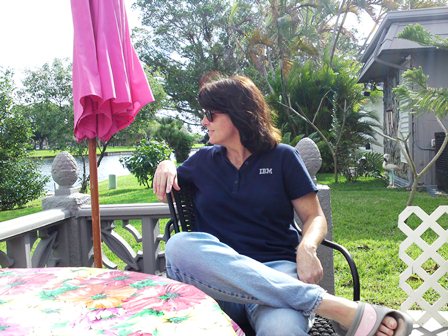
“Life is not measured by the number of breaths we take, but by the moments that take our breath away.”
I received a forward that ended with the above words. When was the last time something took your breath away? Can you remember that rush which forces you to lift your head, push back your shoulders, and draw a deep breath, which is slowly and purposefully exhaled?
I woke up the other morning, and sitting in front of my computer was a new orchid, it took my breath away – and that was a lovely moment. Kate had gone to Home Depot, before I awoke, and I was rewarded with breathtaking beauty.
We are officially in that remodeling stage that I think all homeowners dread. Having completed a handful of smaller projects, it has become time to tackle the feared bathrooms and if we survive the bathrooms, the kitchen. For better or worse, our choices are limited by the existing space, so we will not so much be creating our dream room, as we will be getting rid of mustard colored bathroom fixtures.
In looking at this project, which we have put off, as long as we dared, what I most feared was removing the tile and the tub. Kate said the tile would be easy. She was right. I sat myself down, in the middle of the bathroom floor, screwdriver and hammer, in hand, and chipped the tile off of the floor. I then grew quite confident, stepped in to the tub, and began whittling the walls away. I must say it was a wholly gratifying experience. I slept like a baby that night, not an ounce of frustration, left in my body.
The tub, however, was an entirely different matter. After I vacuumed the newly exposed bathroom floor, and removed about thirty little bags of tiles, we proceeded to remove the sink and its cabinetry, the commode, ceilings, walls, and various sundry pieces – leaving only the dreaded, mustard tub. Kate did not seem worried; she walked around the tub, made several observations and then confidently said she had it under control. Our neighbor, Joe, had previously offered to lend Kate his hack saw. Kate was now prepared to the saw the tub in two. I was dismissed, from my demolition job, as she boldly grabbed the saw, and began to cut the tub away.
I do not think that Kate has ever held a hack saw before, much less used a hack saw, but that did not matter. Over the next several hours, I popped my head, into the bathroom countless times, asking if I could be of help. The answer was always the same, no, I have it under control. Kate is one of the most methodical people I have ever known. She reads directions, and goes from point A to B to C, until she arrives at Z. I know this is the first tub she has ever removed. The hack saw was very loud, and there was bath tub dust, flying through the room, as she held the saw in one hand, and with a crow bar in the other hand, sawed the tub in two, centimeter by centimeter. When she finally had that tub in two, she took my breath away!
In fact, lately Kate has repeatedly taken my breath away. Last week, we had stopped by Fran’s, to wish her a Happy New Year, on Rosh Hashanah. After our visit, as we were walking to the door, I asked Fran what the proper greeting was for Rosh Hashanah. Before Fran could answer, Kate said: L’shanah tovah, with the ease of a child being asked if they like ice-cream. Fran shrugged her shoulders, and said see Kate knows. Kate did know, and I found her breathtaking!
A few nights later, as we were walking, I asked Kate a question in reference to our day. She proceeded to address my concerns, and without the slightest hesitation, ended her comments by saying insha’allah, (إن شاء الله), Arabic for God willing. I could not help but laugh aloud, and repeat insha’allah back. Clearly, Nour’s family has had an impact on Kate; and not only was she learning Hebrew, but also Arabic – an entirely breathtaking moment.
Kate, like our neighbor Tom, was born at Saint Ann’s hospital, in Cleveland, Ohio. She is the picture of the American Mid-West, and embodies the American ideal. A civic minded, responsible and dependable, hard working, person, who makes sure that the car is clean, the lawn tidy, the bills are paid, and the Christmas lights are up and working. She is also the most fearless, determined, and strongest person which I have known. Kate was raised in an affluent neighborhood, and grew up with friends she had known since pre-school, in a predictable world.
When I first met her, she was a student at Ohio State University, where Tom’s wife, Ruth, also studied. (The world can sometimes seem very small.) Kate was twenty years old and desperately wanting out of the cold. I had stopped to see my Mother and sister, Caroline, after a trip to Europe and the Middle East. It was Caroline who introduced me to Kate, whom I suggested come visit me in the summer. Kate did not want to wait, so off we went, on our first cross country drive. As we crossed the state line, into California, Kate pulled the car over, to change her clothes – she had promised herself sunshine, so the jeans were placed in the back seat, and on came some very colorful, surfer type shorts. Her joy was palpable.
As the months passed, we found ourselves living in a hotel, where I was working, until the hotel went bankrupt, moving to a tent, in my other sister’s yard, on to the beach, in the same tent, then in a boat, belonging to Kate’s boss, where she made ten cents per pizza, and finally into an apartment, which required more than ten cents a pizza to maintain. By that time, we were living in Long Beach, California; I was working in a book store, making six dollars an hour, and Kate decided she needed a different job.
During High School, Kate had painted houses, during her summer break. She decided to get a job painting houses, which she was certain, would pay more than ten cents a house or wall. After trying more traditional venues, like the want adds, Kate told me that the best way to get a job as a painter was to stand outside of a paint store. I will never forget that day. Kate dressed up in some old painters pants, which had become shorts, and stood herself in front of a Benjamin Moore Paint Store, where she preceded to ask everyone who came and went if they needed help.
I sat in our little Volkswagen Bug, which was literally held together with chewing gum and rubber bands, watching as Kate stood there for countless hours. She was propositioned, laughed at, and ignored. She never wavered. I would occasionally take her water, or one of the peanut butter sandwiches, which we lived on, and beg her to come back to the car. It was a very hot, sunny day, and I was mortified for her; but she would not leave. Kate did not care that the men, going in out of the store, made fun of her, nor did she let the crude and vulgar comments dissuade her, she just kept asking if anyone needed help; until someone finally said yes. I believe the man’s name was Martin; he offered Kate ten dollars an hour and told her where to report, the next day. Kate had a new job, and remembering how she behaved that day, still takes my breath away.
During the last twenty years, I have seen a lot of change in Kate’s life. She and I often joke about what Laurie, Kate’s sister, once called the O diet. After not having seen Kate in a few years, Laurie asked Kate if she was still on the O diet? Kate did not understand the question, and asked for clarification. Laurie answered, Oreos, Cheerios, and Spaghettio’s. We all laughed. It was true, when I first met Kate, she had a rather limited palate – she blames it on Cleveland. I think Laurie might well be shocked at the foods which Kate now craves!
I will never forget the first time Kate was inundated with a house full of Latin’s, who insisted on a kiss for hello and good-by. She looked at me in her mid-western horror, wanting to scream out: When will it stop? It was too much touching and kissing, for someone from a world where handshakes were a sign of intimacy. But it laid the foundation for our Jewish neighborhood, which requires a kiss on each cheek, for hello and good-by. Kate mastered two kisses, and was not even fazed by Nour, who brought us the three kiss hello and good-by.
Often, in life, we are deprived of the pleasure of watching someone grow and blossom. So many of us simply become something, and settle into a comfortable life, where we surround ourselves with likeminded people, never to be challenged or forced outside of our comfort zone. Kate is not one of those people. She is fearless, and willingly takes on everything from metal tubs to me – and that truly leaves me breathless.
That is all for now.
~ M ~
September 2007
Happy Birthday
Someone once told me that I was a paradox, and always would be. As the words left their mouth, I recall thinking that was the most honest and profound assessment of my person, that anyone had ever made. I like driving with the windows down and the heater or air conditioner, on. I love being surrounded by people, but need an inordinate amount of time alone. I am a Republican, but I am pro-choice. The list goes on.
I have twice made Kate return new cell phones, which she has purchased, for me, as gifts. I hate every time she, whose favorite magazine is Wired, updates and changes our technology. I am mortified by the thought of 2009, when the analog television will become history, and I will be forced to learn how to use a whole new system. Yet, as much as I have resisted digital cameras and touch screen appliances, I love my computer and the Internet, continually marveling at the magic which my fingers conjure up.
Kate has said that she often feels like she is walking into another era, when she enters our home. This is especially true if I am revisiting my love affair with Pug Henry, by re-reading The Winds of War and War and Remembrance, Herman Wouk’s fictional accounts of World War II. I will fill the house with war time music, I am especially fond of the Smithsonian collections of World War II love songs; make a pot of tea, a tray of scones, and reminisce about days I have never lived.
A few years ago, for Christmas, Kate gave me an old, portable Royal typewriter, in a hard case. She purchased it from eBay, for around twenty five dollars. Knowing my particular proclivity, Kate thought of putting it in the trash, so that I might make it one of my finds. It was a good idea. I love the typewriter. The romantic in me likes to think that it once belonged to some dashing war correspondent that used it to record fascinating historical moments that played out in front of him.
She also gave me a black, bakelite phone, from Argentina, which was used in the late 1940’s and early 1950’s. Last year, we entertained some of Kate’s colleagues, and now friends, from Argentina, and Julian recognized the phone. He proceeded to tell me that the phones were popularized under the Peron government, and for the nominal fee of $10.70 a moth, Argentines were able to purchase phone service, with no additional charges for the calls. He well remembered the phone in his grandmother’s home.
I love my 1940’s technology. The objects are beautiful and functional, still. I have always said that I wish I had been twenty in 1940, and that I would have liked to have been alive during those days when every thing seemed so noble and vital, whether it was or not is irrelevant to my time travel fantasy.
Our dear friend Fran, who allows us to drop in, late at night, lived that romantic life which I can only read about or see in movies. It is always such a pleasure to hear her stories – especially the tales of her travels with Milton, her husband, whom she lost a couple of years ago. They stayed at the famous Peninsula Hotel in Hong Kong, where one day Milton went off to work, and Fran went down to breakfast, to find that she was the only woman in the restaurant – the next day she ordered breakfast in her room, and still remembers the elegant offerings. They also stayed at the Imperial Hotel, in Japan, designed by Frank Lloyd Write, which no longer stands, and even visited Africa, on a picture safari, where they leisurely vacationed at William Holden’s Mount Kenya Safari Club – these are the days I dream about.
I am always pleased when Fran invites us to her home, as she did ten days ago, on a Thursday evening. I walked in to find the table laden with gastronomic delights, and adorned with exquisite Champagne flutes. Fran had planned a small gathering to celebrate my birthday. It was the perfect evening, and I was profoundly moved by her kindness and thoughtfulness.
Yet, the highlight of the evening, was listening to her and Charlotte, as they suddenly began to discuss opera. The conversation was initiated when someone commented on the recent death of Luciano Pavarotti, without a second breath, the women began discussing his voice, with an expertise which I am only accustomed to hearing on Charlie Rose. They continued comparing his voice with Placido Domingo and Jose Carreras – debating whose voice was stronger and sweeter and how they each differed from one another, and then Beverly Sills’ passing was mentioned, and suddenly they were talking about Joan Sutherland.
The conversation went on for several minutes, and I very much wished I had paper and pen with me, as I would have liked to take notes, to be able to go and listen to the artist and pieces which they discussed. As they spoke, I wondered if I would agree with their assessments, knowing full well that I lacked the knowledge to make a meaningful contribution to their exchange, but pleased that I was at least able to enjoy it as a spectator, I suppose much the way I enjoy 1940.
As the week progressed, I was brought back into 2007. I began to hear from faraway friends who also wished me a happy birthday. Suhail and Nellie sent an e-card, and I was later able to speak with them and much of Nour’s family, that have now all gone back to Kuwait. I called Nour, who lives blocks away, and he put me on speaker, on his cell phone. In a few seconds, he connected, through his computer, to Kuwait, where suddenly we were all chatting, as if they too were blocks away – a rather remarkable feat.
On the day of my birthday, Luciana phoned me, also through her computer, to wish me a happy birthday, from Argentina. Lu and Kate met last year, through a website. Before going to Argentina, Kate had posted a note, saying that we were going to be spending some time in Argentina, on business, and wondered if any locals might suggest a must see list. Luciana answered Kate’s request, with some insightful information, and an invitation to have dinner. Thus began a new friendship, which would have been impossible without the Internet and the technology of today.
The birthday celebrations culminated this Saturday, in an exceptionally well kept secret – a surprise party that at the risk of being redundant, took my breath away. The party was organized by the same group of friends with whom we went to the baseball game, last month.
We have two Luis’s, in our group. With each other, they use the Latin penchant for the diminutive which translates into Big Luis and Little Luis. They were a gift from IBM, as was Marcial. At one time, they all worked with Kate, I began to know them through Kate and her technology – emails, conference calls, and digital photographs. I would occasionally send them dinner, when they all worked together, and eventually the dinners evolved into meals in our homes, and the exquisite additions of Yami, Big Luis’ wife, Patty, Little Luis’s wife, and Adriana, Marcial’s wife, who is also one of the computer geniuses.
On Saturday, Kate told me that she wanted to drop by Big Luis’s house to borrow a tile cutter. I suggested she go alone, or that we pick it up on Sunday. She countered with a dinner invitation, and I acquiesced.
Yami answered the door, amicable, as always, and welcomed us into her home. As we stepped through the living room and into the den, there was a sudden burst of congratulatory wishes, from the darkened room. Noisemakers, streamers, and balloons set the tone of the evening, which was highly unexpected, and deeply cherished. I am still recalling the lovely toast, and feeling humbled by such attention and affection.
At one point, during the evening, I found myself discussing Tivo, a system by which television shows are digitally recorded, to be seen at a later time, with Patty and Yami. Perhaps it would be more correct to say I found myself sitting between Patty and Yami, as they discussed Tivo, much as Fran and Charlotte had discussed opera singers. The conversation between Patty and Yami was equally interesting, and my contribution equally absent. (I am pleased to have such bright friends, from whom I can learn. I am also quite impressed with Yami and Patty’s abilities as dance instructors. Between the two of them, they had Kate spinning and twirling, almost like a Latin Dancing Queen, to quote Patty.)
This is a group which truly appreciates, understands, and embraces technology. For the most part, as we are rather spread out geographically, technology is how we stay in touch, with group emails, cell phone conversations, and digital photographs, which Marcial, the official group photographer, generously post on a web page for us all to visit.
As we were leaving, around five o’clock, the next morning, after a perfect evening of food and conversation and dancing, I remarked to Big Luis what a pleasure his music selections had been, all night. I told him that he reminded me of a friend, in California, Carl, who back in the day of record albums, would manage to keep the music playing throughout our parties, always choosing the perfect records to spin. Big Luis did it with the aid of a small, hand held device – though he did take me to the garage, to reveal an impressive stack of long play albums – be still my heart.
It has been an interesting few weeks. On Sunday, I spoke with Shahnaz, who lives in California; she called me on her cell phone. Amongst other things, Shahnaz updated me on Lia, who lives in Greece. As Shahnaz and I spoke, I thought about how several weeks ago, I had been up at four o’clock, in the morning, reading the latest news from the BBC, via the Internet, regarding that string of devastating fires in Greece, when I received an email from Shahnaz, telling me that she had just gotten off of the phone with Lia, and that all was well. The relief had been instantaneous, something not possible in 1940.
On a daily basis, I am awed by the amount of information available on the Internet. I think I might have been a rocket scientist, had the Internet been around when I was a child – though I know nothing about rocket science. I could not imagine going back to a world without Google or Wikipedia, but it is this birthday which has made me appreciate how very much my computer and through it the Internet, actually allow me to stay connected to the people I love.
Though, I will close by saying how nice it was to open Melody’s card, also from California. Melody and I still write letters and send cards. It is always a pleasure to see an envelope, addressed by hand, from Melody. Occasionally, she sends photographs, the real kind, on paper, of her sons, and a note catching me up on her life. This week, it was a Winslow Homer card, an artist which we both love, in which she had written birthday greetings. I have repeatedly walked by her card, and taken pleasure in its presence, and enjoyed thinking about how it can be read and reread; however, I must admit that I have also thought that perhaps we too should think about incorporating a webcam into our friendship — do I speak sacrilege?
Thank you all, for a lovely birthday – that is all for now






